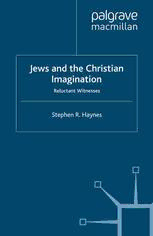
Jews and the Christian Imagination: Reluctant Witnesses PDF
Preview Jews and the Christian Imagination: Reluctant Witnesses
JEWS AND THE CHRISTIAN IMAGINATION STUDIES IN LITERATURE AND RELIGION General Editor: David Jasper, Director of the Centre for the Study of Literature and Theology, University of Glasgow Studies in Literature and Religion is a major series of interdisciplinary titles, both monographs and essays, concerned with matters of literature, art and textuality within religious traditions founded upon texts and textual study. In a variety of ways they are concerned with the fundamental issues of the imagination, literary perceptions and theory, and an understanding of poetics for theology and religious studies. Published titles include: David Scoll Arnold LIMINAL READINGS Forms of Otherness in Melville, Joyce and Murdoch John D. Barbour THE CONSCIENCE OF THE AUTOBIOGRAPHER Ethical and Religious Dimensions of Autobiography Tibor Fabiny THE LION AND THE LAMB Figuralism and Fulfilment in the Bible, Art and Literature Max Harris THEATRE AND INCARNATION David Jasper (editor) POSTMODERNISM, LITERATURE AND THE FUTURE OF THEOLOGY David Jasper (editor) TRANSLATING RELIGIOUS TEXTS Ann Loades and Michael McLain (editors) HERMENEUTICS, THE BIBLE AND LITERARY CRITICISM Irena S. M. Makarushka RELIGIOUS IMAGINATION AND LANGUAGE IN EMERSION AND NIETZSCHE Linda Munk THE TRIVIAL SUBLIME George Pattison KIERKEGAARD: THE AESTHETIC AND THE RELIGIOUS Jews and the Christian ltnagination Reluctant Witnesses Stephen R. Haynes Assistant Professor of Religious Studies Rhodes College, Memphis, Tennessee M MACMILLAN ©Stephen R. Haynes 1995 All rights reserved. No reproduction, copy or transmission of this publication may be made without written permission. No paragraph of this publication may be reproduced, copied or transmitted save with written permission or in accordance with the provisions of the Copyright, Designs and Patents Act 1988, or under the terms of any licence permitting limited copying issued by the Copyright Licensing Agency, 90 Tottenham Court Road, London W1P 9HE. Any person who does any unauthorised act in relation to this publication may be liable to criminal prosecution and civil claims for damages. First published 1995 by MACMILLAN PRESS LTD Hound mills, Basingstoke, Hampshire RG21 2XS and London Companies and representatives throughout the world ISBN 978-1-349-39115-8 ISBN 978-0-230-37619-9 (eBook) DOI 10.1057/9780230376199 A catalogue record for this book is available from the British Library. 10 9 8 7 6 5 4 3 2 1 04 03 02 01 00 99 98 97 96 95 For Christiana This page intentionally left blank Contents Acknowledgments viii General Editor's Preface xi 1 Introduction 1 2 The Witness-People Myth and Its Alternatives 12 3 The Witness-People Myth in History 25 4 Karl Barth, the German Church Struggle and the Witness-People Myth 64 5 Walker Percy and the Witness-People: Signposts in A Strange Land 90 6 Christian Holocaust Theology and the Witness-People Myth: The Jews' Fate as Sign, The Holocaust as Revelation, Israel as Message 120 7 Dispensational Premillennialism: The Jew as Key to the Kingdom 141 8 Conclusions 171 Notes 185 Bibliography 214 Index 219 Vll Acknowledgments I wish to acknowledge gratefully the following publishers, who have granted their permission for the use of previously published material: Scholars Press, for permission to use excerpts from Prospects for Post-Holocaust Theology: "Israel" in the Theologies of Karl Barth, Jurgen Moltmann and Paul van Buren (1991); Oxford University Press, for permission to use a revised portion of "Theology as Fiction and Fiction as Theology: Karl Barth and Walker Percy on the Jews," which appeared in Journal of Literature and Theology 5:4 (December, 1991), 388-407; and for permission to use a portion of "Thanatos and Shoah: Walker Percy's Parable of the Holocaust",. which appeared in Volume 8 (1994) of Holocaust and Genocide Studies; and the Journal of the American Academy of Religion, for permission to use an excerpt from "Christian Holocaust Theology: A Critical Reassess ment," published in the Summer 1994 issue of JAAR. Several persons and organizations have contributed to this book. Research that eventually found its way into these pages was funded by the Rotary Foundation, the English-Speaking Union of Atlanta, the Memphis Jewish Federation, the Association for Religion and Intellectual Life, and the Rhodes College Faculty Development Endowment. The latter two made explicit contributions of time and money toward the completion of this project. Michael Leslie and James Clifton of Rhodes College read parts of the manuscript and offered insightful suggestions. David Jasper of the University of Glasgow read the entire manuscript. Professor Jasper's guidance and support have been crucial to my professional development since 1988, when I spent a year under his tutelage at the University of Durham. David has supported this work from the outset and has provided invaluable direction along the way. Other persons to whom I am indebted include the members of the 1991 Coolidge Research Colloquium at The Episcopal Divinity School in Cambridge, Mass., especially Rabbi Richard Levy; the faculty members at Rhodes College who have shown interest in my research and have challenged me to think in new ways; my mother, Jean Haynes, who kept me up to date on the "prophecy books" discussed in Chapter 7; my students at Rhodes College; and my wife Natalie and daughter Christiana, whose willingness to allow Vlll Acknowledgments ix me to spend many hours in front of a computer screen made the timely completion of this book possible. Christiana Hope, born on Easter Day 1991, has, very simply, changed my life. This book is dedicated to her, in a spirit of thankfulness for such a tangible sign of divine favor.
